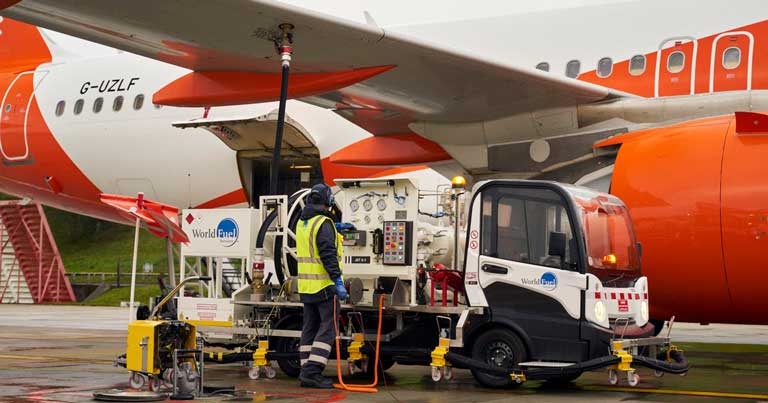
London Gatwick has announced that it is using sustainable aviation fuel (SAF) on all easyJet flights operating from Gatwick to Glasgow throughout the COP26 Climate Change Conference.
The first of a total of 42 easyJet flights departed this week and was powered by a 30% Neste SAF blend. This marks the first time a departing flight at Gatwick has used sustainable aviation fuel (SAF) and also the first usage by any easyJet service from the UK.
The initiative is part of a partnership between aviation fuel supplier Q8Aviation, easyJet, Gatwick Airport and Neste to achieve a net carbon emission reduction in the fuel used in aviation and work towards an ultimate goal for aviation to reach net zero emissions by 2050.
Q8Aviation has delivered the first supply of Neste MY Sustainable Aviation Fuel to the fuel supply at Gatwick Airport. Neste’s sustainable aviation fuel, which is fully certified, is produced from 100% renewable and sustainable waste and residue raw materials, such as used cooking oil and animal fat waste.
In its neat form and over its life cycle, Neste MY Sustainable Aviation Fuel can achieve a reduction of up to 80% of greenhouse gas emissions compared to fossil jet fuel use.
The process starts with Neste-produced SAF which is blended with Jet A-1 fuel at a depot upstream of Gatwick Airport to create a drop-in fuel that is compatible with existing aircraft engines and the airport infrastructure, without requiring extra investment. Q8Aviation then deliver the fuel to the main storage tanks at Gatwick Airport for supply to easyJet aircraft via the airport’s hydrant system.
The incorporation of SAF into Gatwick’s operations is an important proof of concept for the airport in demonstrating its continued commitment to work with its aviation partners on decarbonisation.
In a further move to decarbonise operations and reduce greenhouse gas emissions, easyJet has partnered with World Fuel Services to introduce an electric hydrant dispenser at the airport which will serve its fleet of 71 aircraft at Gatwick.
According to the airline, the electric hydrant dispenser is the first in the UK and based on diesel equivalents which are estimated to burn 6630 litres of diesel every year, it can reduce 18,000 kg of CO2 emissions annually. The electric hydrant dispenser adds to the electric ground services equipment already supporting easyJet aircraft operations at Gatwick Airport.
Jane Ashton, Director of Sustainability at easyJet said: “At easyJet, we want to play our part to lead the decarbonisation of aviation. We’re pleased to announce that today we’re operating using SAF in a proof of concept flight from Gatwick having also committed to using a SAF blend on all flights operating from Gatwick to Glasgow throughout COP26, thanks to a collaborative effort with our partners involved in this project.
“The availability of SAF still needs to grow but they will be an important interim solution in our decarbonisation pathway, while we are supporting the development of zero-emission aircraft, which will be the most sustainable solution for short-haul networks such as our own in the long term. In the meantime, we are operating our flights as efficiently as possible and are currently the only major European airline to offset the carbon emissions from the fuel used for all our flights, which has an impact right now.”
Tim Norwood, Director of Corporate Affairs, Planning and Sustainability of Gatwick Airport said: “We are pleased to work with our partners to be the first airport in the VINCI Airport network to introduce SAF on a commercial flight and prove the concept that Gatwick is ready and able to operationally utilise SAF. SAF is one of several ways that UK aviation and Gatwick will reach net zero carbon by 2050, alongside carbon offsets, airspace modernisation and continued innovation in aerospace technology, including electric, hydrogen and hybrid aircraft systems. With smart Government policy to underpin investment in cost competitive UK SAF production, many more flights could be using UK produced SAF by the mid-2020s.”







